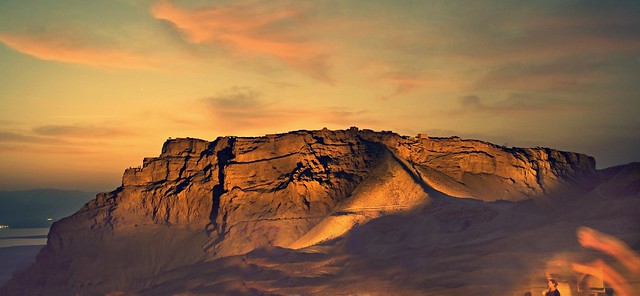Dry Spells
 In the spring of the year 73, thousands of Roman soldiers raided Masada, a fortress on top of a cliff in the Judean Desert. For seven years, the Jews had tried, unsuccessfully, to split from the Roman empire, and Masada was the last holdout. According to the ancient historian Josephus, when the Romans breached Masada’s walls, they found 960 dead bodies of Jewish extremists, called Sicarii, who had killed themselves to avoid the inevitable enslavement. Because of Masada’s remote location and harsh, dry climate, nothing much happened to the site for the next 2,000 years, until archaeologists started digging it up in 1963. They found attack ramps and siege towers (some of the best examples we have, apparently, of Roman war technologies), palaces, cisterns, swimming pools, 27 human skeletons and, deep under the rubble, a handful of seeds.The seeds were stored at room temperature until 2005, when scientists performed radiocarbon dating and identified them as the famed date palm of Judea. (Psalm 92: “The righteous will flourish like a palm tree…They will still bear fruit in old age, they will stay fresh and green.”) The researchers planted the remaining three seeds. One of them grew. When the results were published, in 2008, the plant, nicknamed Methuselah, was more than three feet tall. By this past November, it was more than six feet tall, and healthy enough to be moved out of quarantine and into a park.No one knows exactly how the seeds managed to survive so long, but it almost certainly had to do with the extremely high temperatures and low humidity of the desert. Methuselah is just one of many examples of organisms that can preserve themselves by shutting down for awhile. In the winter, the wood frog’s heart stops beating and up to 45 percent of its body turns to ice. The tardigrade, a microscopic eight-legged ‘waterbear’, can survive at least 10 years in a cold environment by expelling nearly all of the water from its body.“Nature is very wise at solving these problems,” says cryobiologist Amir Arav, whose company, Core Dynamics, is based about 85 miles from Masada. For nearly 30 years, Arav has been trying to mimic nature’s preservation feats in the lab. He has frozen rat livers and hearts, and sheep ovaries, and has freeze-dried human sperm, knee cartilage, stem cells and blood.Read more at...The Last Word on Nothing, January 2012.
In the spring of the year 73, thousands of Roman soldiers raided Masada, a fortress on top of a cliff in the Judean Desert. For seven years, the Jews had tried, unsuccessfully, to split from the Roman empire, and Masada was the last holdout. According to the ancient historian Josephus, when the Romans breached Masada’s walls, they found 960 dead bodies of Jewish extremists, called Sicarii, who had killed themselves to avoid the inevitable enslavement. Because of Masada’s remote location and harsh, dry climate, nothing much happened to the site for the next 2,000 years, until archaeologists started digging it up in 1963. They found attack ramps and siege towers (some of the best examples we have, apparently, of Roman war technologies), palaces, cisterns, swimming pools, 27 human skeletons and, deep under the rubble, a handful of seeds.The seeds were stored at room temperature until 2005, when scientists performed radiocarbon dating and identified them as the famed date palm of Judea. (Psalm 92: “The righteous will flourish like a palm tree…They will still bear fruit in old age, they will stay fresh and green.”) The researchers planted the remaining three seeds. One of them grew. When the results were published, in 2008, the plant, nicknamed Methuselah, was more than three feet tall. By this past November, it was more than six feet tall, and healthy enough to be moved out of quarantine and into a park.No one knows exactly how the seeds managed to survive so long, but it almost certainly had to do with the extremely high temperatures and low humidity of the desert. Methuselah is just one of many examples of organisms that can preserve themselves by shutting down for awhile. In the winter, the wood frog’s heart stops beating and up to 45 percent of its body turns to ice. The tardigrade, a microscopic eight-legged ‘waterbear’, can survive at least 10 years in a cold environment by expelling nearly all of the water from its body.“Nature is very wise at solving these problems,” says cryobiologist Amir Arav, whose company, Core Dynamics, is based about 85 miles from Masada. For nearly 30 years, Arav has been trying to mimic nature’s preservation feats in the lab. He has frozen rat livers and hearts, and sheep ovaries, and has freeze-dried human sperm, knee cartilage, stem cells and blood.Read more at...The Last Word on Nothing, January 2012.